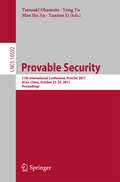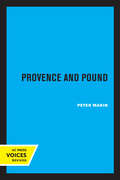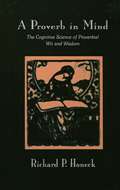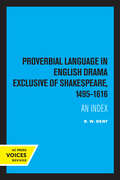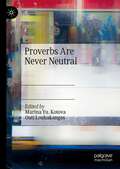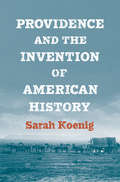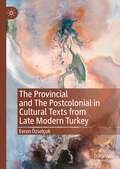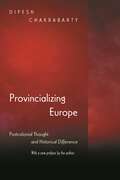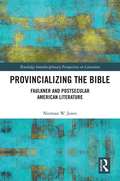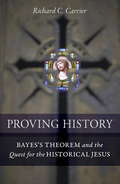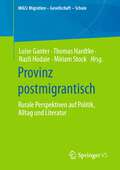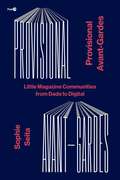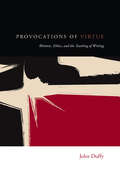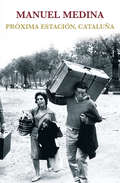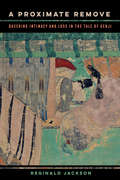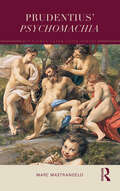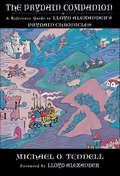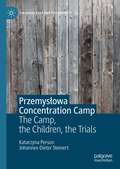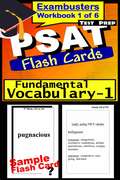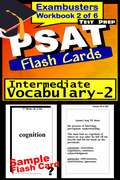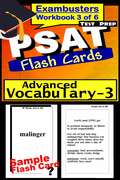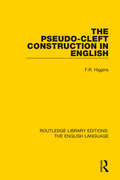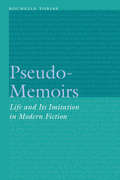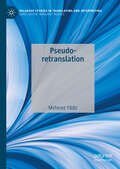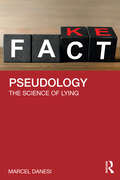- Table View
- List View
Provable Security
by Tatsuaki Okamoto Yong Yu Man Ho Au Yannan LiThis book constitutes the refereed proceedings of the 11th International Conference on Provable Security, ProvSec 2017, held in Xi'an, China, in October 2017. The 24 full papers and 5 short papers presented were carefully reviewed and selected from 76 submissions. The papers are grouped in topical sections on secure cloud storage and computing; digital signature and authentication; authenticated encryption and key exchange; security models; lattice and post-quantum cryptography; public key encryption and signcryption; proxy re-encryption and functional encryption; protocols.
Provence and Pound
by Peter MakinThis title is part of UC Press's Voices Revived program, which commemorates University of California Press’s mission to seek out and cultivate the brightest minds and give them voice, reach, and impact. Drawing on a backlist dating to 1893, Voices Revived makes high-quality, peer-reviewed scholarship accessible once again using print-on-demand technology. This title was originally published in 1978.
A Proverb in Mind: The Cognitive Science of Proverbial Wit and Wisdom
by Richard P. HoneckSEE SHORT BLURB FOR ALTERNATE COPY... A complex, intriguing, and important verbal entity, the proverb has been the subject of a vast number of opinions, studies, and analyses. To accommodate the assorted possible audiences, this volume outlines seven views of the proverb -- personal, formal, religious, literary, practical, cultural, and cognitive. Because the author's goal is to provide a scientific understanding of proverb comprehension and production, he draws largely on scholarship stemming from the formal, cultural, and cognitive views. The only book about proverbs that is written from the standpoint of cognitive science, cognitive psychology, and experimentalism, this text provides a larger, more interdisciplinary perspective on the proverb. It also gives a theoretically more integrated approach to proverb cognition. The conceptual base theory of proverb comprehension is extended via the "cognitive ideals hypothesis" so that the theory now addresses issues regarding the creation, production, and pragmatics of proverbs. This hypothesis also has strong implications for a taxonomy of proverbs, proverb comprehension, universal vs. culture-specific aspects of proverbs, and some structural aspects of proverbs. In general, the book extends the challenge of proverb cognition by using much of what cognitive science has to offer. In so doing, the proverb is compared to other forms of figurative language, which is then discussed within the larger rubric of intelligence and the inclination for using indirect modes of communication. Child developmental and brain substrates are also discussed.
Proverbial Language in English Drama Exclusive of Shakespeare, 1495-1616: An Index
by R. W. DentThis title is part of UC Press's Voices Revived program, which commemorates University of California Press’s mission to seek out and cultivate the brightest minds and give them voice, reach, and impact. Drawing on a backlist dating to 1893, Voices Revived makes high-quality, peer-reviewed scholarship accessible once again using print-on-demand technology. This title was originally published in 1984.
Proverbs Are Never Neutral
by Marina Yu. Kotova Outi LauhakangasThis book examines how proverbs can carry ethnonyms and contradictory oppositions in everyday speech, and interrogates the belief that such nuances are national in nature by comparing across languages and cultures. The authors bring together linguistic terms and typologies from Slavonic, Germanic, Romance, Finno-Ugric and Somali proverbs (with their English parallels) to enrich contrastive paremiology. The book pushes the thematic boundaries of the paremiological minima of languages by drawing on fields including sociolinguistics, and it will be of interest to students and scholars of cultural linguistics, comparative cultural studies, sociolinguistics, social identity, anthropology, cognitive semiotics, and the history of words and concepts.
Providence and the Invention of American History
by Sarah KoenigHow providential history—the conviction that God is an active agent in human history—has shaped the American historical imagination In 1847, Protestant missionary Marcus Whitman was killed after a disastrous eleven-year effort to evangelize the indigenous peoples of the Pacific Northwest. By 1897, Whitman was a national hero, celebrated in textbooks, monuments, and historical scholarship as the &“Savior of Oregon.&” But his fame was based on a tall tale—one that was about to be exposed. Sarah Koenig traces the rise and fall of Protestant missionary Marcus Whitman&’s legend, revealing two patterns in the development of American history. On the one hand is providential history, marked by the conviction that God is an active agent in human history and that historical work can reveal patterns of divine will. On the other hand is objective history, which arose from the efforts of Catholics and other racial and religious outsiders to resist providentialists&’ pejorative descriptions of non‑Protestants and nonwhites. Koenig examines how these competing visions continue to shape understandings of the American past and the nature of historical truth.
The Provincial and The Postcolonial in Cultural Texts from Late Modern Turkey
by Evren ÖzselçukThis book explores Turkey’s complicated relationship to modernity and its status within the new global order by tracing the ambivalent ways in which taşra (the provinces) is constituted in contemporary Turkish cinema and literature. Connoting much more than its immediate spatial meaning as those places outside of the center(s), taşra is a way of naming what modernity decries as spatial peripherality, temporal belatedness, and cultural backwardness. It has functioned historically as a psychosocial repository for what Turkish modernity degrades and disavows, enabling a mapping of the predicaments and contradictions of Turkish modernization and national identity-constitution. Organized around taşra as its central analytic and informed by postcolonial, psychoanalytical, and critical theory, the book examines the extent to which dominant codings of taşra are affirmed and/or complicated in cinematic and literary narratives by award-winning filmmakers Nuri Bilge Ceylan and Fatih Akın and Nobel laureate Orhan Pamuk.
Provincializing Europe: Postcolonial Thought and Historical Difference - New Edition (Princeton Studies in Culture/Power/History)
by Dipesh ChakrabartyFirst published in 2000, Dipesh Chakrabarty's influential Provincializing Europe addresses the mythical figure of Europe that is often taken to be the original site of modernity in many histories of capitalist transition in non-Western countries. This imaginary Europe, Dipesh Chakrabarty argues, is built into the social sciences. The very idea of historicizing carries with it some peculiarly European assumptions about disenchanted space, secular time, and sovereignty. Measured against such mythical standards, capitalist transition in the third world has often seemed either incomplete or lacking. Provincializing Europe proposes that every case of transition to capitalism is a case of translation as well--a translation of existing worlds and their thought--categories into the categories and self-understandings of capitalist modernity. Now featuring a new preface in which Chakrabarty responds to his critics, this book globalizes European thought by exploring how it may be renewed both for and from the margins.
Provincializing the Bible: Faulkner and Postsecular American Literature
by Norman JonesWhy, in our supposedly secular age, does the Bible feature prominently in so many influential and innovative works of contemporary U.S. literature? More pointedly, why would a book indelibly allied with a long history of institutionalized oppressions play a supporting role—and not simply as an object of critique—in a wide variety of landmark literary representations of marginalized subjectivities? The answers to these questions go beyond mere playful re-appropriations or subversive resignifications of biblical themes, figures, and forms. This book shows how certain contemporary authors invoke the Bible in ways that undermine clear distinctions between "subversive" and "traditional"—indeed, that undermine clear distinctions between "secular" and "sacred." By tracing a key source of such complex literary invocations of the Bible back to William Faulkner’s major novels, Provincializing the Bible argues that these literary works, which might be termed postsecular, ironically provincialize the Bible as a means of reevaluating and revalorizing its significance in contemporary American culture.
Proving History
by Richard C. CarrierAnyone with an interest in historical methods, how historical knowledge can be justified, new applications of Bayes's Theorem, or the study of the historical Jesus will find this book to be essential reading.Almost all experts agree that the Jesus of the Bible is a composite of myth, legend, and some historical evidence. So what can we know about the real Jesus? For more than one hundred and fifty years, scholars have attempted to answer this question. Unfortunately, the quest for the historical Jesus has produced as many different images of the original Jesus as scholars who have studied the subject. The result is a confused mass of disparate opinions with no consensus view of what actually happened at the dawn of Christianity. And this uncertainty is not unique to the historical study of Jesus. The problems related to establishing the reliability of historical criteria apply equally to any historical analysis of the persons and events that have shaped our lives and the beliefs we hold dear. This in-depth discussion of New Testament scholarship and the challenges of history as a whole proposes Bayes's Theorem, which deals with probabilities under conditions of uncertainty, as a solution to the problem of establishing reliable historical criteria. The author demonstrates that valid historical methods--not only in the study of Christian origins but in any historical study--can be described by, and reduced to, the logic of Bayes's Theorem. Conversely, he argues that any method that cannot be reduced to this theorem is invalid and should be abandoned. Writing with thoroughness and clarity, the author explains Bayes's Theorem in terms that are easily understandable to professional historians and laypeople alike, employing nothing more than well-known primary school math. He then explores precisely how the theorem can be applied to history and addresses numerous challenges to and criticisms of its use in testing or justifying the conclusions that historians make about the important persons and events of the past. The traditional and established methods of historians are analyzed using the theorem, as well as all the major "historicity criteria" employed in the latest quest to establish the historicity of Jesus. The author demonstrates not only the deficiencies of these approaches but also ways to rehabilitate them using Bayes's Theorem.
Provinz postmigrantisch: Rurale Perspektiven auf Politik, Alltag und Literatur (MiGS: Migration - Gesellschaft - Schule)
by Luise Ganter Thomas Hardtke Nazli Hodaie Miriam StockDer Band entwickelt eine postmigrantische Perspektive auf provinzielle oder provinzbezogene Kontexte und Positionierungen und vereinigt dabei literarische Perspektiven mit empirischen Zugängen zu Politik und Alltag. Es werden postmigrantische Aushandlungen in ruralen Kontexten in den Blick genommen und zudem gefragt, wie sich Vorstellungen zur „Provinz“ wie auch zur „Migration“ gegenseitig bedingen, neuformieren und wo dies konkret geschieht.
Provisional Avant-Gardes: Little Magazine Communities from Dada to Digital (Post*45)
by Sophie SeitaWhat would it mean to be avant-garde today? Arguing against the notion that the avant-garde is dead or confined to historically "failed" movements, this book offers a more dynamic and inclusive theory of avant-gardes that accounts for how they work in our present. Innovative in approach, Provisional Avant-Gardes focuses on the medium of the little magazine—from early Dada experiments to feminist, queer, and digital publishing networks—to understand avant-gardes as provisional and heterogeneous communities. Paying particular attention to neglected women writers, artists, and editors alongside more canonical figures, it shows how the study of little magazines can change our views of literary and art history while shedding new light on individual careers. By focusing on the avant-garde's publishing history and group dynamics, Sophie Seita also demonstrates a new methodology for writing about avant-garde practice across time, one that is applicable to other artistic and non-artistic communities and that speaks to contemporary practitioners as much as scholars. In the process, she addresses fundamental questions about the intersections of aesthetic form and politics and about what we consider to be literature and art.
Provocations of Virtue: Rhetoric, Ethics, and the Teaching of Writing
by John DuffyIn Provocations of Virtue, John Duffy explores the indispensable role of writing teachers and scholars in counteracting the polarized, venomous “post-truth” character of contemporary public argument. Teachers of writing are uniquely positioned to address the crisis of public discourse because their work in the writing classroom is tied to the teaching of ethical language practices that are known to moral philosophers as “the virtues”—truthfulness, accountability, open-mindedness, generosity, and intellectual courage. Drawing upon Aristotle’s Nicomachean Ethics and the branch of philosophical inquiry known as “virtue ethics,” Provocations of Virtue calls for the reclamation of “rhetorical virtues” as a core function in the writing classroom. Duffy considers what these virtues actually are, how they might be taught, and whether they can prepare students to begin repairing the broken state of public argument. In the discourse of the virtues, teachers and scholars of writing are offered a common language and a shared narrative—a story that speaks to the inherent purpose of the writing class and to what is at stake in teaching writing in the twenty-first century. This book is a timely and historically significant contribution to the field and will be of major interest to scholars and administrators in writing studies, rhetoric, composition, and linguistics as well as philosophers and those exploring ethics.
Próxima estación, Cataluña
by Manuel MedinaLa historia de la inmigración andaluza en Cataluña, y de cómo ésta acogió y protegió a los trabajadores sin importar su procedencia. La creación de La Caixa, del Hospital Vall d'Hebrón, del hotel Casa Fuster, de Radio Tele-Taxi, a través de sus protagonistas. Manuel Medina pertenece a la generación de los niños del hambre, nacidos en los difíciles años de la posguerra. Su infancia transcurrió en las duras tierras de Jaén, en la Cañada de la Fuensanta, donde la necesidad dirigía estas vidas que contaban con el amor de la familia como único patrimonio. En este ambiente, y cuando apuntaba la adolescencia en los años cincuenta, empezó a ver cómo gran parte de su familia emigraba a Cataluña en busca, ya no de una vida mejor, sino tan sólo de la posibilidad de comer todos los días. Hoy, sesenta años después de que sus tíos y primos comenzaron a coger el tren de la emigración, el autor realiza un viaje por Cataluña en busca de aquellos viajeros del hambre. Sus historias son muy distintas, mientras unos apenas consiguieron cubrir las necesidades vitales, otros alcanzaron un nivel de vida y éxito profesional que ni podían imaginar que existían. Nombres de sobra conocidos: Justo Molinero, José Manuel Lara, Enrique Morente, Paco Ibáñez,... acompañan a personalidades de allí como Francesc Moragas, Isidro Fainé, Antoni Durán i Lleida, Joan Manuel Serrat, Jordi Pujol, Artur Mas, etc. La familia Medina, y otras provenientes de Cataluña, viven hoy perfectamente integradas en la sociedad catalana, lo mismo que muchos otros emigrantes con los que el autor se ha ido encontrando en el final de este viaje que comenzó hace más de medio siglo y que tenía por Próxima estación, Cataluña.
A Proximate Remove: Queering Intimacy and Loss in The Tale of Genji (New Interventions in Japanese Studies #2)
by Reginald JacksonA free ebook version of this title is available through Luminos, University of California Press's Open Access publishing program. Visit www.luminosoa.org to learn more. How might queer theory transform our interpretations of medieval Japanese literature and how might this literature reorient the assumptions, priorities, and critical practices of queer theory? Through a close reading of The Tale of Genji, an eleventh-century text that depicts the lifestyles of aristocrats during the Heian period, A Proximate Remove explores this question by mapping the destabilizing aesthetic, affective, and phenomenological dimensions of experiencing intimacy and loss. The spatiotemporal fissures Reginald Jackson calls "proximate removes" suspend belief in prevailing structures. Beyond issues of sexuality, Genji queers in its reluctance to romanticize or reproduce a flawed social order. An understanding of this hesitation enhances how we engage with premodern texts and how we question contemporary disciplinary stances.
Prudentius’ Psychomachia (Routledge Later Latin Poetry)
by Marc MastrangeloThis new translation brings to life Prudentius' Psychomachia, one of the most widely read poems in western Europe from Late Antiquity through the Renaissance. With accompanying notes and introduction, this volume provides a fresh exploration of its themes and influence. The Psychomachia of Prudentius (348–c. 405), an allegorical epic poem of nearly 1,000 lines about the battle between the virtues and the vices for possession of the human soul, led early modern scholars to refer to the late antique poet as "the Christian Vergil." Combining depictions of violent, single combats with allusions to pagan epic poetry, biblical scenes, and Christian doctrine, the poem captures the dynamism of the later Roman Empire in which the pagan world was giving way to a new, Christian Europe. In this volume, the introduction sets the historical and literary context and illuminates the Psychomachia’s prominent role in western literary history. Mastrangelo’s translation aims to capture the rhetorical power of the author’s Roman Christian Latin for the 21st-century reader. The notes provide the reader with in-depth information on Prudentius’ Latinity, the Roman epic tradition, and Christian doctrine. This volume is directed at students and scholars across the disciplines of comparative literature, classics, religion, and ancient and medieval studies, as well as any reader interested in the history and development of literature in the West.
The Prydain Companion: A Reference Guide to Lloyd Alexander's Prydain Chronicles
by Michael O. TunnellAn informative resource for formal studies of the Prydain Chronicles, as well as an excellent opportunity to delve into the fantastic workings of Prydain"The Prydain Companion is more than a quick reference or handy glossary, though it is all of that as well. Instructive, certainly. But, like any good companion, a pleasure to be with over a long period of time." —Lloyd Alexander, from the forewordThis intriguing volume is at once a wonderful reference resource and a vehicle for exploration and discovery in itself. Complete with a biographical sketch of Lloyd Alexander, a personal foreword by Mr. Alexander, a "How to Use the Companion" section from the author, pronunciation keys, excerpts throughout, and—most substantially—an alphabetical guide to the peoples, places, and objects of the Prydain Chronicles, The Prydain Companion is a one-stop reference book for a beloved world of fantasy and magic.For those who love the works of Lloyd Alexander—young readers, teachers, researchers, all—and those who are only beginning to know them, here is a worthy and useful travelmate.
Przemysłowa Concentration Camp: The Camp, the Children, the Trials (The Holocaust and its Contexts)
by Katarzyna Person Johannes-Dieter SteinertThis book explores one of the most notorious aspects of the German system of oppression in wartime Poland: the only purpose-built camp for children under the age of 16 years in German-occupied Europe. The camp at Przemysłowa street, or the Polen-Jugendverwahrlager der Sicherheitspolizei in Litzmannstadt as the Germans called it, was a concentration camp for children. The camp at Przemysłowa existed for just over two years, from December 1942 until January 1945. During that time, an unknown number of children, mainly Polish nationals, were imprisoned there and subjected to extreme physical and emotional abuse. For almost all, the consequences of atrocities which they endured in the camp remained with them for the rest of their lives. This book focuses on the establishment of the camp, the experience of the child prisoners, and the post-war investigations and trials. It is based on contemporary German documents, post-war Polish trials and German investigations, as well as dozens of testimonies from camp survivors, guards, civilian camp staff and the camp leadership
PSAT Test Prep Flash Cards: Fundamental Vocabulary - 1 (Exambusters PSAT Workbook #1 of 6)
by Ace Inc.<P><P><i>Advisory: Bookshare has learned that this book offers only partial accessibility. We have kept it in the collection because it is useful for some of our members. Benetech is actively working on projects to improve accessibility issues such as these.</i><P><P> 300 basic words every high school freshman should know. Includes part of speech, pronunciation, succinct, easy-to-remember definition, and common synonyms and antonyms.<P><P> <P>EXAMBUSTERS PSAT Prep Workbooks provide comprehensive, fundamental PSAT review--one fact at a time--to prepare students to take practice PSAT tests. Each PSAT study guide focuses on one specific subject area covered on the PSAT exam. From 300 to 600 questions and answers, each volume in the PSAT series is a quick and easy, focused read. Reviewing PSAT flash cards is the first step toward more confident PSAT preparation and ultimately, higher PSAT exam scores!
PSAT Test Prep Flash Cards: Intermediate Vocabulary 2 (Exambusters PSAT Workbook #2 of 6)
by Ace Inc.<P><P><i>Advisory: Bookshare has learned that this book offers only partial accessibility. We have kept it in the collection because it is useful for some of our members. Benetech is actively working on projects to improve accessibility issues such as these.</i><P><P> 500 frequently tested PSAT/NMSQT words every high school student should know. Perfect for anyone who wants to enrich their vocabulary! Improve your reading comprehension and conversation.<P><P> Includes sample sentence, part of speech, pronunciation, succinct, easy-to-remember definition, and common synonyms and antonyms. <P>EXAMBUSTERS PSAT Prep Workbooks provide comprehensive, fundamental PSAT review--one fact at a time--to prepare students to take practice PSAT tests. Each PSAT study guide focuses on one specific subject area covered on the PSAT exam. From 300 to 600 questions and answers, each volume in the PSAT series is a quick and easy, focused read. Reviewing PSAT flash cards is the first step toward more confident PSAT preparation and ultimately, higher PSAT exam scores!
PSAT Test Prep Flash Cards: Advanced Vocabulary (Exambusters PSAT Workbook #3)
by Ace Inc.<P><P><i>Advisory: Bookshare has learned that this book offers only partial accessibility. We have kept it in the collection because it is useful for some of our members. Benetech is actively working on projects to improve accessibility issues such as these.</i><P><P> 350 frequently tested PSAT/NMSQT words every college freshman should know. Perfect for anyone who wants to enrich their vocabulary! Improve your reading comprehension and conversation.<P><P> Includes sample sentence, part of speech, pronunciation, succinct, easy-to-remember definition, and common synonyms and antonyms. <P>EXAMBUSTERS PSAT Prep Workbooks provide comprehensive, fundamental PSAT review--one fact at a time--to prepare students to take practice PSAT tests. Each PSAT study guide focuses on one specific subject area covered on the PSAT exam. From 300 to 600 questions and answers, each volume in the PSAT series is a quick and easy, focused read. Reviewing PSAT flash cards is the first step toward more confident PSAT preparation and ultimately, higher PSAT exam scores!
The Pseudo-Cleft Construction in English (Routledge Library Editions: The English Language #13)
by F. R. HigginsThis work, first published in 1979, was a doctoral dissertation submitted to the Department of Foreign Literatures and Linguistics of the Massachusetts Institute of Technology on June 22nd 1973. The ostensible central topic of this essay is a construction which is generally known as the "pseudo-cleft" construction. This essay aims to provide an overall picture of the construction, and show why another treatment of it is necessary. This book will be of interest to those pursuing the topic of copular sentences.
Pseudo-Memoirs: Life and Its Imitation in Modern Fiction (Frontiers of Narrative)
by Rochelle TobiasPseudo-Memoirs redefines the notion of fiction itself, a form that has all too often been understood in terms of its capacity to produce a seeming reality. Rochelle Tobias argues that the verisimilitude of the novel derives not from its object but from the subjectivity at its base. What generates the plausibility of fiction is not the referentiality of its depictions but the intentionality of consciousness. Edmund Husserl developed the idea that consciousness is always intentional in the sense that it is directed outside itself toward something that it does not find so much as it constitutes as an object. Pseudo-memoirs reveal the full implications of this position in their double structure as the tale of their own telling or the fiction of life-writing. In so doing they reveal how the world of fiction is constructed, but more important they bring to the fore the idealist premises that fuel the novel and guarantee its truth, even when it remains an invention of the imagination. Rochelle Tobias explores novels by Thomas Mann, Robert Walser, Thomas Bernhard, and W. G. Sebald in conjunction with philosophical and theoretical texts by René Descartes, Husserl, Friedrich Nietzsche, György Łukács, Roland Barthes, and Maurice Blanchot.
Pseudo-retranslation (Palgrave Studies in Translating and Interpreting)
by Mehmet YildizThis book presents pseudo-retranslations as a new phenomenon of translational intertextuality, revealing how pseudo-retranslations establish large networks of intertextuality across academic works, how academic authors have recourse to this procedure as they create their academic texts, and how pseudo-retranslations contribute to the dissemination of translation-distorted scholarly knowledge and lead to epistemically polluted academic ecosystems. Pseudo-retranslation can be defined as an academic author’s partial or complete exploitation of another academic author’s translation and presenting it as a retranslation of the source text. This phenomenon, first documented in Yildiz (2021), arises from academic authors’ failure to refer to or translate primary sources – particularly in English. Since there occurs no actual retranslation process, this procedure is called pseudo-retranslation. Using a range of academic texts from the Turkish context as case studies, the author presents the integral constituents of this phenomenon, and the behavioural patterns of its renderers. This book will be of particular interest to academics and postgraduates in the field of translation studies and (corpus) linguistics.
Pseudology: The Science of Lying
by Marcel DanesiIn an age where fake news, conspiracy theories, and outright lies by political and cultural leaders are commonplace, we may be becoming accustomed to lying, or worse, even immune to it. Pseudology unravels the reasons for this by describing a “science of lying” that looks at various aspects of this trait, from how it affects the brain to how it distorts perception.Interest in lying goes back to antiquity and writing and debate has only increased in the present day, but what is missing is a treatment that synthesizes the work from linguists, political scientists, anthropologists, psychologists, neuroscientists, and sociologists, tying them to the philosophical and literary views of lying throughout history. Such a treatment can be called "pseudology": an interdisciplinary science for classifying, collating, and assessing ideas about lying. This book is a comprehensive treatment of pseudology, emphasising the importance of studying lying in our current climate. Pseudology addresses questions such as:• What is a lie?• Why do we lie?• Why are we so susceptible to lying?• How does lying activate false beliefs and generate hatred of others?• How has lying shaped the course of history (at least to some extent)?• How has lying been adopted as a basic thematic element in literature and the arts?Synthesising research from a broad range of disciplines and from the perspective of a leading cognitive linguist, this text weaves ideas and theories about lying cohesively into an overall interdisciplinary science. This landmark book is vital for students and scholars of language as well as anyone interested in politics, sociology, or psychology.
